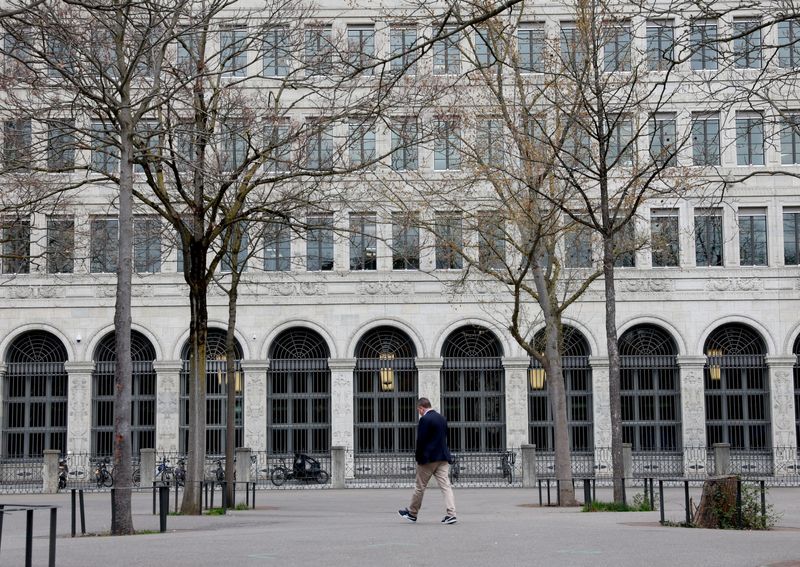By Indradip Ghosh
BENGALURU (Reuters) - The Swiss National Bank will wait until at least June before cutting interest rates, according to a strong majority of economists polled by Reuters, who said it would make shallower cuts this year than peers.
The SNB may choose to wait on the sidelines until the U.S. Federal Reserve and European Central Bank start cutting interest rates, widely expected in June, to prevent further weakness in the Swiss franc.
A declining franc poses a risk of a flare-up in inflation which eased to a near 2-1/2 year low of 1.2% in February and has been within the central bank's target of 0%-2% since May 2023.
In December, the SNB said it was no longer focusing on foreign currency sales to prop up the franc as a measure to dampen imported inflation, with SNB Chairman Thomas Jordan saying this was no longer necessary.
Jordan recently announced his decision to step down in September.
The franc has slid around 3.5% so far this year and some say unexpectedly cutting rates ahead of other major central banks could cause it to weaken further.
A near 80% majority, 25 of 32 economists in the March 13-18 Reuters poll, predicted the SNB would hold the policy rate unchanged at 1.75% - the lowest among G10 nation central banks other than the Bank of Japan - on March 21.
"There are several reasons for a June rate cut and keeping rates on hold in March. The Swiss franc has depreciated a bit against the dollar and the euro since the beginning of the year ... They (the SNB) are not sure whether there are no second-round effects," said Alessandro Bee, economist at UBS.
The survey result was in line with market pricing for the first rate cut, which only recently changed to June from March, following a similar move earlier this year on expectations for the first Fed and ECB rate cuts.
However, there was no clear consensus among economists around the exact timing of the first cut. While 14 predicted it to come in June, 11 expected the first reduction in the third quarter or later. Only seven said the SNB would cut on Thursday.
"They will be cautious to cut rates in a situation where they cannot be sure whether the ECB and the Fed are going to follow," said UBS's Bee. "There is still the possibility the Fed and the ECB keep rates on hold for longer."
But Switzerland also has a very low inflation rate, much lower than in the U.S. or the euro zone.
"We have been forecasting for a long time that inflation would fall to close to 1% at the start of this year and that the SNB would cut rates in March. And with our non-consensus inflation forecast having been largely realised, we think it is likely that the SNB will proceed with a rate cut (on March 21)," wrote Adrian Prettejohn, Europe economist at Capital Economics.
The SNB will cut interest rates by a cumulative 50 basis points to 1.25% this year, survey medians showed. If realised, that would be shallower than the 75 to 100 basis points of rate reductions expected from the Fed and ECB.
Inflation was expected to average 1.5% this year, the Reuters poll found, before easing to 1.3% in 2025 and 2026.
"We hold our SNB call for a longer pause followed by a later/slower cutting cycle than the ECB," noted Chiara Angeloni, Europe economist at Bank of America.
"Should domestic inflation turn out stronger than the SNB thinks...we would expect the SNB to deliver tighter financial conditions via FX appreciation - hence the foreign assets' balance sheet unwind - instead of higher rates."

When asked about the bigger risk around the magnitude of rate cuts this year, a slim majority of economists, 10 of 18, said it could be less than they expected and eight said it could be more.
(For other stories from the Reuters global economic poll:)